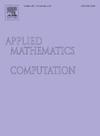T-S fuzzy fault-tolerant load frequency control for power systems with energy storage system under DoS attacks and actuator failures: A two-step adaptive event-triggered mechanism
IF 3.4
2区 数学
Q1 MATHEMATICS, APPLIED
引用次数: 0
Abstract
This research focuses on the T-S fuzzy non-fragile fault-tolerant load frequency control (FTLFC) problem in power systems with energy storage system (ESS), considering the coexistence of DoS attacks and local actuator failures. Firstly, a random distribution model is constructed based on the distribution characteristics of actuator local failures to accurately characterize the uncertainty of the fault behavior. Considering the scarcity of network bandwidth resources, this study introduces an innovative two-step adaptive event-triggered mechanism (TSAETM), significantly improving data transmission efficiency and reducing network load by intelligently screening and transmitting crucial data packets. Furthermore, to enhance the accuracy and robustness of the system state monitoring, a flexible switched observer framework is designed, which can adapt to the dynamic changes of the system and provide more accurate state estimation. Subsequently, advanced segmental Lyapunov functional analysis methods, combined with linear matrix inequality (LMI) techniques, are employed to rigorously demonstrate that the closed-loop switched system (CLSS) can maintain global exponential stability (GES) and exhibit the ideal performance when subjected to DoS attacks and actuator failures. Finally, the effectiveness of the proposed scheme is comprehensively verified through simulation experiments.
DoS攻击和执行器故障下储能电力系统的T-S模糊容错负荷频率控制:两步自适应事件触发机制
考虑DoS攻击和局部执行器故障共存的情况下,研究了具有储能系统的电力系统的T-S模糊非脆弱容错负荷频率控制问题。首先,根据执行器局部故障的分布特征,建立随机分布模型,准确表征执行器故障行为的不确定性;考虑到网络带宽资源的稀缺性,本研究引入了一种创新的两步自适应事件触发机制(TSAETM),通过智能筛选和传输关键数据包,显著提高了数据传输效率,降低了网络负载。为了提高系统状态监测的准确性和鲁棒性,设计了灵活的切换观测器框架,使其能够适应系统的动态变化,提供更准确的状态估计。随后,采用先进的分段Lyapunov泛函分析方法,结合线性矩阵不等式(LMI)技术,严格证明了闭环切换系统(CLSS)在遭受DoS攻击和执行器故障时可以保持全局指数稳定性(GES)并表现出理想的H∞性能。最后,通过仿真实验全面验证了所提方案的有效性。
本文章由计算机程序翻译,如有差异,请以英文原文为准。
求助全文
约1分钟内获得全文
求助全文
来源期刊
CiteScore
7.90
自引率
10.00%
发文量
755
审稿时长
36 days
期刊介绍:
Applied Mathematics and Computation addresses work at the interface between applied mathematics, numerical computation, and applications of systems – oriented ideas to the physical, biological, social, and behavioral sciences, and emphasizes papers of a computational nature focusing on new algorithms, their analysis and numerical results.
In addition to presenting research papers, Applied Mathematics and Computation publishes review articles and single–topics issues.

 求助内容:
求助内容: 应助结果提醒方式:
应助结果提醒方式:


